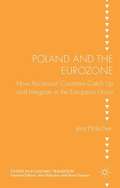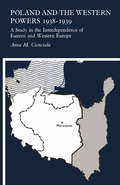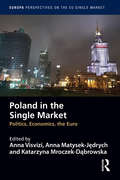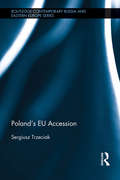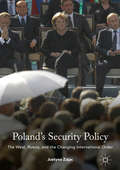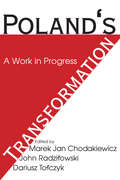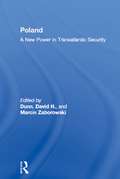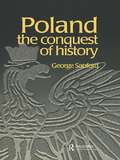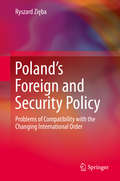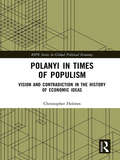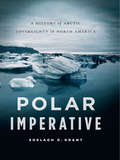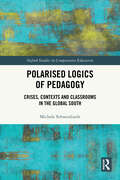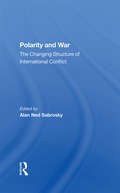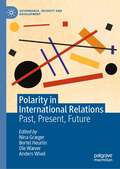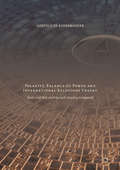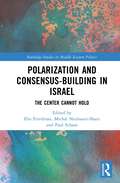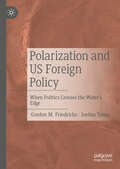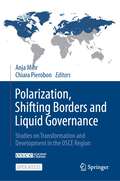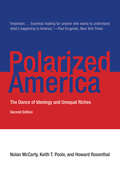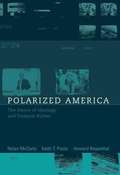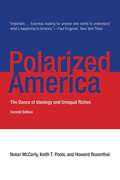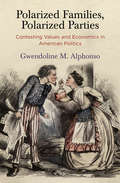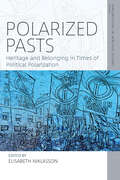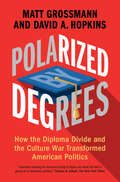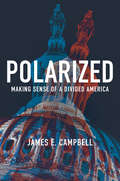- Table View
- List View
Poland and the Eurozone: How Accession Countries Catch Up and Integrate in the European Union (Studies in Economic Transition)
by Jens HölscherPoland is one of Europe's economic out-performers. The country's history and geography encourage it to be in favour of deeper European integration. This book aims to contribute to discussions on the future shape of EMU and the next steps ahead.
Poland and the Western Powers 1938-1938: A Study in the Interdependence of Eastern and Western Europe
by Anna M. CiencialaThis study has two objectives. The first is to explain the nature and historical roots of the problems facing Polish foreign policy in 1938–39 and the manner in which they were approached by the men who shaped and directed Polish diplomacy. The second is to illustrate the political interdependence in these years of Eastern and Western Europe. This interdependence hinged on the German problem. The attitude of France and Britain towards Poland and Eastern Europe as a whole was primarily a reflection of their policy towards Germany; at the same time, this policy was the decisive factor in the individual reactions of Germany's eastern neighbours to the threat of resurgent German power.As far as Poland was concerned, she not only had to strive to avert the danger of German revisionism, the realization of which would have made her a vassal of Berlin, but she also had to consider the possibility of Soviet expansion at her expense. This study is, however, primarily concerned with Polish attempts to obtain security with regard to Germany and, in the period in question, this was the main objective of Polish diplomacy.
Poland in the Single Market: Politics, economics, the euro (Europa Perspectives on the EU Single Market)
by Anna Visvizi, Anna Matysek-Jędrych and Katarzyna Mroczek-DąbrowskaBy all accounts, the case of Poland and its segue to market economy and democracy is a success story: 30 years of uninterrupted growth and development, infrastructure expansion, and modernization of the economy and society. Epochal changes have unfolded in a timespan of merely three decades. Change has taken place so fast that children born in late 1980s and onwards cannot remember what life in Poland under communism was like and cannot relate to it. Also, many elderly people, easy victims of romanticizing their own youth, tend to forget. As a result, the uniqueness of Polish transition and transformation, the boldness and efficiency of reforms, and the success that Polish society mastered together, tend to be undermined today both domestically and internationally. Poland has now been a member of the EU for more than 15 years. During that time, Poland’s image on the EU scene evolved from newcomer, through ‘model child’, champion of growth, to – in some respects – a maverick. This volume’s objective is to remind society, old and young, researchers, scholars and practitioners, that Poland’s success is an outcome of well-thought out and bold structural reforms implemented in a swift and timely manner, of society’s support for these reforms, and of third actors’ benign assistance. Looking back on the 30 years since the collapse of communism, and at the over 15 years of EU membership, this book offers an interdisciplinary, comprehensive and critical insight into factors and processes that have led to today’s Poland.
Poland's EU Accession (Routledge Contemporary Russia and Eastern Europe Series)
by Sergiusz TrzeciakThis book examines the process of Poland’s accession negotiations to the European Union between 1998-2003. An empirical study based on Robert Putnam’s two-level game model, it charts the influence and role of key domestic actors and groups on the negotiations especially in three critical, controversial, areas - areas where EU accession threatened to bring about a profound transformation to Polish life - agriculture, with particular emphasis on direct payments and production quotas; the purchase of real estate by foreigners; and the free movement of labour. This book demonstrates the complex interaction between the domestic and international level of negotiations and furthermore, shows how critical this link can be to negotiation outcomes at the international level. It reveals how susceptible Poland’s negotiation process was to domestic pressure, particularly public opinion and interest groups. Drawing heavily on qualitative analysis – such as press releases, news wires, policy documents, as well as quantitative analyses, such as the use of opinion polls, and supported by in-depth, unrestricted interviews with key Polish decision-makers, this book examines the dynamics of policy formation in Poland and shows how this translated into the final conditions of accession.
Poland's Security Policy
by Justyna ZającThis book examines how the changing post-Cold War order affected Poland's security policy and particularly how the West's weakening position and Russia's revisionist policy reinforced the traditional view of security in Poland. It addresses the reasons why Poland, a middle power in Central Europe, adopted a bridging strategy in the early 1990s; how this strategy changed along with the redistribution of power in the international system; why, after the 2008 Georgian-Russian War, Poland took steps to support NATO consolidation, strengthen relations with the USA, and expand its own military capabilities; and how the Ukraine crisis affected Poland's security. This overview is an invaluable resource for students of international and European studies, security studies, political science, as well as for decision-makers, politicians, EU staff, and anyone interested in international politics in Central Europe.
Poland's Transformation: A Work in Progress
by Bjorn KurtenPoland has carried out two peaceful revolutions in the span of one generation: first, the self-limiting movement of Solidarity, which undermined the legitimacy of Communism and then a negotiated transfer of power from Communism to free market democracy. Today, while Poland is seen as a success story and is joining political and economic associations in the democratic West, Poles themselves seem downcast. They ask: is social anomie a price worth paying for a successful transformation? In making moral compromises with an outgoing tyranny, can one avoid cynicism and disappointment with democracy?Zbigniew Brzezinski, professor of American Foreign Policy at Johns Hopkins University has calledPolish Transformation"a work that provides a comprehensive as well as incisive overview of the extraordinary difficult and historically unprecedented process of transforming an increasingly corrupt and decayed totalitarian system into a modern democracy."John Lenczowski, director of the Institute of World Politics, adds that "this extremely useful volume explains the essential elements of the post-communist political transition in Poland. Its authors convey...the cultural and ideological underpinnings that can be captured only by authorities who have developed over a lifetime that special sixth sense for detecting the elusive and unquantifiable soul of a country."Radek Sikorski, the executive director of the New Atlantic Initiative at the American Enterprise Institute, writes that "we should be grateful to the authors and editors of this thoughtful volume for asking questions which remain relevant for that uncomfortably large part of humanity that still lives under totalitarian or authoritarian regimes."
Poland: A New Power in Transatlantic Security
by Marcin Zaborowski David H. DunnThis authoritative volume assesses how the recently democratized political system in Poland is adapting to the challenges posed by the country's adhesion to NATO which it joined in 1999. The contributors analyse Poland's performance as a newcomer.
Poland: The Conquest of History (Postcommunist States and Nations #Vol. 3.)
by George SanfordPoland pioneered the collapse of communism in Eastern Europe. Domestic reformism and the negotiated abdication of ruling elites in 1989 have structured the country's politics in the 1990s. But the division between the communist and Solidarity camps continues to cause problems for a potential reform coalition aiming to complete modernisation through the restructuring required for EU membership. Secular-Catholic and rural-urban conflicts, and well as the growing regional split between the north-west and south-east, have fragmented political life and the party system. Nevertheless, Poland has made remarkable steps in the consolidation of democracy and the development of her political system, whilst maintaining social stability; she is also successfully transcending her historical security dilemma of open western and eastern frontiers and stronger, aggressive neighbours, by embedding herself in Europe through membership of NATO and the EU. Poland is overcoming her historical problems.
Poland’s Foreign and Security Policy: Problems of Compatibility with the Changing International Order
by Ryszard ZiębaThis book analyses determinants and the evolution of Poland’s foreign and security policy in the changing international order. By studying historical, geopolitical and domestic factors, the author offers a better understanding of Poland’s national interests and sheds new light on its foreign relations with the USA, Russia and the European Union. Furthermore, the author also discusses Poland’s cooperation within international organisations, such as NATO and the EU.
Polanyi in times of populism: Vision and contradiction in the history of economic ideas (RIPE Series in Global Political Economy)
by Christopher HolmesThe rise of populism across Europe and the US – first in the wake of the 2008 global financial crisis and then in the shape of Donald Trump’s presidential campaign and the Brexit vote in 2016 – are indicative of a seismic shift in the terrain of economic ideas in public discourse. Settled liberal norms concerning ever-increasing international market expansion, and the political integration required to sustain it, have been decisively upset by political forces that, whilst once on the fringes, now dominate economic debate. How might we make sense of this ideological breakdown and what might we hope for next? This book turns to the work of Karl Polanyi for answers, developing the expansive, historicised approach to political economy that Polanyi pioneered. Holmes provides a wide-ranging history of economic ideas read in terms of a series of hopeful theoretical visions of order, in which political, social and ecological contradictions could be transcended in one way or another. Through this, the book demonstrates that the failing utopian visions of pre-2008 economic orthodoxy, which have formed the backdrop to the rise of populism today, are only the latest in a series that stretches across economic thought in Western modernity as a whole. This book will interest students and scholars of IPE, political science, sociology, anthropology, law and history.
Polar Imperative
by Shelagh D. GrantBased on Shelagh Grant's groundbreaking archival research and drawing on her reputation as a leading historian in the field, Polar Imperative is a compelling overview of the historical claims of sovereignty over this continent's polar regions. This engaging, timely history examines:the unfolding implications of major climate changesthe impact of resource exploitation on the indigenous peoplesthe current high-stakes game for control over the adjacent waters of Alaska, Arctic Canada and Greenlandthe events, issues and strategies that have influenced claims to authority over the lands and waters of the North American Arctic, from the arrival of the first inhabitants around 3,000 BCE to the presentsovereignty from a comparative point of view within North America and parallel situations in the European and Asian ArcticThis book will become a standard reference on Arctic history and will redefine North Americans' understanding of the sovereign rights and responsibilities of Canada's northernmost region.
Polarised Logics of Pedagogy: Crises, Contexts and Classrooms in the Global South (Oxford Studies in Comparative Education)
by Michele SchweisfurthThis novel book demonstrates the polarised logics that exist between exploring cultural, structural, political, and historical contexts as a primary focus for pedagogical research versus an interventionist agenda that isolates pedagogy and its components from their environments.Combining theoretical discussions with empirical evidence and case studies, the book provides a synthesising approach to both research and educational planning, recognising pedagogy as an open system while acknowledging that not all teaching methods are equal when it comes to enhancing learning. Considering the so-called learning crisis and learning poverty in the context of Sustainable Development Goal 4 in the wake of the COVID-19 pandemic, this book is also sensitive to concerns about the mental health and wellbeing of young people and the sustainability of the planet.Ultimately providing a timely, informed, and balanced discussion of these issues, this book will appeal to researchers, scholars, and post-graduate and doctoral students working in pedagogical research or international and comparative education, and anyone interested in the relationship between education and international development.
Polarity And War: The Changing Structure Of International Conflict
by Alan Ned SabroskyA fundamental transformation is underway in the structure of the international political system, with changes in both the definition and the distribution of power in world politics. But the precise extent of those changes and their implications for the conduct of foreign affairs remain unclear. The contributors to this book draw upon a common data base to provide the most current assessment available of the relationships among power, alliance, polarity, and international conflict in today's emerging world system.
Polarity in International Relations: Past, Present, Future (Governance, Security and Development)
by Ole Wæver Anders Wivel Bertel Heurlin Nina GrægerThis book brings together a group of leading scholars on international relations to develop and apply the concept of polarity on past and present international relations and discuss its applicability and usefulness in the future. Despite a comprehensive debate on a global power shift, often discussed in terms of the decline of the United States, the crisis in the liberal international order, and the rise of China, IR´s main concept of power, ‘polarity’, remains undertheorized and understudied. The great powers and their importance for dynamics and processes in the international system are central to current debates on international order, but these debates too often suffer from a combination of politicized empirical analysis and reliance on old theoretical debates and conceptualizations, typically originating in the Cold War security environment. In order to meet these challenges, this book updates, conceptualizes, applies and critically debates the concepts of unipolarity, bipolarity, multipolarity and non-polarity in order to understand the current world order.
Polarity, Balance of Power and International Relations Theory
by Goedele De KeersmaekerThe book discusses the rise of polarity as a key concept in International Relations Theory. Since the end of the Cold War, until at least the end of 2010, there has been a wide consensus shared by American academics, political commentators and policy makers: the world was unipolar and would remain so for some time. By contrast, outside the US, a multipolar interpretation prevailed. This volume explores this contradiction and questions the Neorealist claim that polarity is the central structuring element of the international system. Here, the author analyses different historic eras through a polarity lens, compares the way polarity is used in the French and US public discourses, and through careful examination, reaches the conclusion that polarity terminology as a theoretical concept is highly influenced by the Cold War context in which it emerged. The book is an important resource for students and researchers with a critical approach to Neorealism, and to those interested in the defining shifts the world went through during the last twenty five years.
Polarization and Consensus-Building in Israel: The Center Cannot Hold (Routledge Studies in Middle Eastern Politics)
by Elie Friedman Paul Scham Michal Neubauer-ShaniThis edited volume examines the most pressing social and political issues confronting Israel from a multidisciplinary perspective, focusing on the breakdown of social solidarity and the inability to formulate consensus. The contributors – encompassing political scientists, historians, communication researchers, sociologists, economists, and educators – focus on specific topics that serve as exemplary cases of various trends of consensus and polarization. These trends are examined in the context of ideological, religious, economic, national, and ethnic cleavages. In addition, this volume analyzes how political actors’ preference for “non-decision” on various issues has resulted in the maintenance of a status quo, with cleavages or conflicts being neither mitigated nor polarized. Together, this collection of articles paints a picture of Israel as a state racked by increasing polarization along ideological and religious lines. It is argued that this difficulty in determining a consensual definition of the state threatens to destroy social solidarity in Israel altogether, a climate in which “the center cannot hold.” This book is essential reading for anyone seeking to understand the major internal threats to Israel’s self-definition as a Jewish-democratic state and will also appeal to sociologists and political scientists interested in global polarization trends.
Polarization and US Foreign Policy: When Politics Crosses the Water’s Edge
by Jordan Tama Gordon M. FriedrichsPolarization in the United States has been on the rise for several decades. In this context, few observers expect politics today to stop “at the water’s edge,” as the old cliché goes. But key questions about the relationship between polarization and US foreign policy remain to be fully answered. To what extent are American ideas about foreign policy now polarized along partisan lines? How is polarization changing the foreign policy behavior of the US Congress and President? And how is polarization altering the effectiveness of US foreign policy and influencing America’s role in the world? This edited volume explores these questions and more, bringing together existing knowledge as well as considering how the political dynamics and execution of US foreign policy may evolve in the years ahead.
Polarization, Shifting Borders and Liquid Governance: Studies on Transformation and Development in the OSCE Region
by Anja Mihr Chiara PierobonThis open-access book explores the security dynamics amid the polarization, shifting borders, and liquid governance that define the Zeitenwende era in Europe's eastern neighbourhood and Central Asia. Presenting various case studies, the volume unveils the intricate web of border dynamics and practices, including the nuanced interplay of border disputes within the Organization for Security and Cooperation in Europe (OSCE) member states. The contributions shed new light on how contested borders and liquid modes of governance have impacted the engagement of international organizations such as the European Union (EU), North Atlantic Treaty Organization (NATO), and OSCE in security crises and conflict prevention. Delving deeper, a special part dissects the ongoing Russia-Ukraine conflict and examines European and international responses. By analyzing the stances of diverse European countries, their neighborhood, and international organizations, this section uncovers commonalities and disparities in their approaches to the Ukrainian crisis.
Polarized America, second edition: The Dance of Ideology and Unequal Riches (Walras-Pareto Lectures)
by Keith T. Poole Howard Rosenthal Nolan McCartyUpdated analysis of how the increasing polarization of American politics has been accompanied and accelerated by greater income inequality.The idea of America as politically polarized—that there is an unbridgeable divide between right and left, red and blue states—has become a cliché. What commentators miss, however, is that increasing polarization has been closely accompanied by fundamental social and economic changes—most notably, a parallel rise in income inequality. In this second edition of Polarized America, Nolan McCarty, Keith Poole, and Howard Rosenthal use the latest data to examine the relationships of polarization, wealth disparity, immigration, and other forces. They find that inequality feeds directly into political polarization, and polarization in turn creates policies that further increase inequality. Paul Krugman called the first edition of Polarized America “Important.... Essential reading for anyone who wants to understand what's happening to America.” The second edition has been thoroughly brought up to date. All statistical analyses, tables, and figures have been updated with data that run through 2012 or 2014, and the text has been revised to reflect the latest evidence. The chapter on campaign finance has been completely rewritten (with Adam Bonica as coauthor); the analysis shows that with so much “soft” money coming from very wealthy ideological extremists, there is even greater campaign contribution inequality than income inequality.
Polarized America: The Dance of Ideology and Unequal Riches
by Nolan Mccarty Keith T. Poole Howard RosenthalChoice Outstanding Academic Title, 2007. The idea of America as politically polarized--that there is an unbridgeable divide between right and left, red and blue states--has become a cliche. What commentators miss, however, is that increasing polarization in recent decades has been closely accompanied by fundamental social and economic changes--most notably, a parallel rise in income inequality. In Polarized America, Nolan McCarty, Keith Poole, and Howard Rosenthal examine the relationships of polarization, wealth disparity, immigration, and other forces, characterizing it as a dance of give and take and back and forth causality. Using NOMINATE (a quantitative procedure that, like interest group ratings, scores politicians on the basis of their roll call voting records) to measure polarization in Congress and public opinion, census data and Federal Election Commission finance records to measure polarization among the public, the authors find that polarization and income inequality fell in tandem from 1913 to 1957 and rose together dramatically from 1977 on; they trace a parallel rise in immigration beginning in the 1970s. They show that Republicans have moved right, away from redistributive policies that would reduce income inequality. Immigration, meanwhile, has facilitated the move to the right: non-citizens, a larger share of the population and disproportionately poor, cannot vote; thus there is less political pressure from the bottom for redistribution than there is from the top against it. In "the choreography of American politics" inequality feeds directly into political polarization, and polarization in turn creates policies that further increase inequality.
Polarized America: The Dance of Ideology and Unequal Riches
by Nolan Mccarty Keith T. Poole Howard RosenthalThe idea of America as politically polarized -- that there is an unbridgeable divide between right and left, red and blue states -- has become a cliché. What commentators miss, however, is that increasing polarization has been closely accompanied by fundamental social and economic changes -- most notably, a parallel rise in income inequality. In this second edition of Polarized America, Nolan McCarty, Keith Poole, and Howard Rosenthal use the latest data to examine the relationships of polarization, wealth disparity, immigration, and other forces. They find that inequality feeds directly into political polarization, and polarization in turn creates policies that further increase inequality. Paul Krugman called the first edition of Polarized America "Important.... Essential reading for anyone who wants to understand what's happening to America." The second edition has been thoroughly brought up to date. All statistical analyses, tables, and figures have been updated with data that run through 2012 or 2014, and the text has been revised to reflect the latest evidence. The chapter on campaign finance has been completely rewritten (with Adam Bonica as coauthor); the analysis shows that with so much "soft" money coming from very wealthy ideological extremists, there is even greater campaign contribution inequality than income inequality.
Polarized Families, Polarized Parties: Contesting Values and Economics in American Politics (American Governance: Politics, Policy, and Public Law)
by Gwendoline M. AlphonsoStruggles to define the soul of America roil the nation's politics. Debates over the roles of gays, lesbians, women, immigrants, racial and religious minorities, and disputes over reproductive and abortion rights serve as rallying points for significant electoral groups and their representatives in government. Although the American family lies at the core of these fierce battles, the alignment of family with social or cultural issues is only a partial picture—a manifestation of the new right's late twentieth-century success in elevating "family values" over family economics.Gwendoline Alphonso makes a significant contribution to the prevailing understanding of party evolution, contemporary political polarization, and the role of the family in American political development by placing family at the center of political and cultural clashes. She demonstrates how regional ideas about family in the twentieth century have continually shaped not only Republican and Democratic policy and ideological positions concerning race and gender but also their ideals concerning the economy and the state. Drawing on extensive data from congressional committee hearings, political party platforms, legislation sponsorship, and demographic data from the Progressive, post-World War II, and late twentieth-century periods in the United States, Polarized Families, Polarized Parties offers an intricate and sophisticated analysis of how deliberations around the ideal family became critical to characterizations of party politics. By revealing the deep historical interconnections between family and the two parties' ideologies and policy preferences, Alphonso reveals that American party development is more than a story of the state and its role in the economy but also, at its core, a debate over the political values of family and the social fabric it embodies.
Polarized Pasts: Heritage and Belonging in Times of Political Polarization (Explorations in Heritage Studies #8)
by Elisabeth NiklassonWhen questions of belonging enter the forefront of political debates, so too does heritage. This volume draws critical voices from archaeology, anthropology and the classics into a conversation about political uses of the past in times of radical right populism. The authors show how ancient monuments and sites, bygone eras and political regimes, and even your genetic ancestry, can become wrapped up in polarized political debates. They also highlight how heritage, which is often thought of as a common good, can be dangerous in times of political polarization – erasing nuances between ‘us’ and ‘them’. Together, the texts pave the way for a better understanding of the political role of heritage in society.
Polarized by Degrees: How the Diploma Divide and the Culture War Transformed American Politics
by Matt Grossmann David A. HopkinsOver the past several decades, American society has experienced fundamental changes – from shifting relations between social groups and evolving language and behavior norms to the increasing value of a college degree. These transformations have polarized the nation's political climate and ignited a perpetual culture war. In a sequel to their award-winning collaboration Asymmetric Politics, Grossmann and Hopkins draw on an extensive variety of evidence to explore how these changes have affected both major parties. They show that the Democrats have become the home of highly-educated citizens with progressive social views who prefer credentialed experts to make policy decisions, while Republicans have become the populist champions of white voters without college degrees who increasingly distrust teachers, scientists, journalists, universities, non-profit organizations, and even corporations. The result of this new “diploma divide” between the parties is an increasingly complex world in which everything is about politics – and politics is about everything.
Polarized: Making Sense of a Divided America
by James E. CampbellMany continue to believe that the United States is a nation of political moderates. In fact, it is a nation divided. It has been so for some time and has grown more so. This book provides a new and historically grounded perspective on the polarization of America, systematically documenting how and why it happened.Polarized presents commonsense benchmarks to measure polarization, draws data from a wide range of historical sources, and carefully assesses the quality of the evidence. Through an innovative and insightful use of circumstantial evidence, it provides a much-needed reality check to claims about polarization. This rigorous yet engaging and accessible book examines how polarization displaced pluralism and how this affected American democracy and civil society.Polarized challenges the widely held belief that polarization is the product of party and media elites, revealing instead how the American public in the 1960s set in motion the increase of polarization. American politics became highly polarized from the bottom up, not the top down, and this began much earlier than often thought. The Democrats and the Republicans are now ideologically distant from each other and about equally distant from the political center. Polarized also explains why the parties are polarized at all, despite their battle for the decisive median voter. No subject is more central to understanding American politics than political polarization, and no other book offers a more in-depth and comprehensive analysis of the subject than this one.
